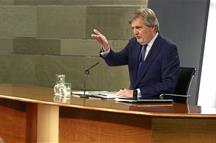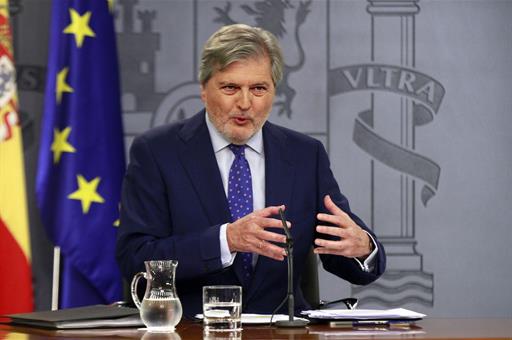Council of Ministers
Government initiates legal change to foster criminal investigations at an EU level
Council of Ministers - 2017.7.14
Moncloa Palace, Madrid
The Council of Ministers analysed, upon a proposal from the Minister for Justice, Rafael Catalá, a draft bill amending the current Law on mutual recognition in criminal matters in the European Union, with the aim of regulating the European Evidence Warrant.
This EU warrant allows the judicial authorities of one country to undertake investigations in another country of the European Union to obtain evidence within the framework of judicial proceedings. Its transposition into the Spanish legal system will allow the receipt of all warrants to be centralised through the Public Prosecutor's Office, will reduce administrative burdens and will enhance the management of human and material resources.
The Minister for Education, Culture and Sport and Government Spokesperson, Íñigo Méndez de Vigo, highlighted that the recognition and enforcement of this mutual trust between countries "is a break from the traditional process of letters rogatory and the formulas of previous conventions which were procedurally slow", and makes relations between judicial authorities more flexible.
The Government Spokesperson pointed out that judicial cooperation is one of the integrating elements of the European Union. In this regard, he recalled that the European Arrest Warrant, approved in 2002, was "one of the most important instruments in bringing to an end the impunity of ETA terrorists".
Appeals against the unconstitutional nature of two laws of the Regional Government of Andalusia
 Pool Moncloa/J.M. CuadradoThe government agreed to request that the President of the Government files an appeal against the unconstitutional nature of a Decree-Law of the Regional Government of Andalusia that sets the working day of its public servants at a total of 35 hours per week.
Pool Moncloa/J.M. CuadradoThe government agreed to request that the President of the Government files an appeal against the unconstitutional nature of a Decree-Law of the Regional Government of Andalusia that sets the working day of its public servants at a total of 35 hours per week.
Íñigo Méndez de Vigo explained that the government considers that the regional legislation breaches the General State Budget Act for 2013, which established the working day for personnel that work for the public authorities at 37.5 hours a week, as well as Royal Decree Law 14/2012, on urgent measures to streamline public spending on education.
The Government Spokesperson argued that "State public servants cannot be subject to a certain regime according to the autonomous region" in which they work. Moreover, he pointed out that he does not feel it is "cohesive and territorially supportive" for any specific region to break away from the common framework for the whole of Spain.
Furthermore, the government filed a second appeal against the unconstitutional nature of the Regional Budget Act for 2017 that authorises the hiring of personnel to strengthen the workforce as a result of the application of the ordinary working day comprising 35 hours a week.
However, Íñigo Méndez de Vigo clarified that dialogue with the Regional Government of Andalusia remains ongoing with the aim of reaching an agreement on this matter.
Terrorism
 Pool Moncloa/J.M. CuadradoIn his political assessment of the week, the Government Spokesperson highlighted the 20th anniversary of the kidnapping and murder of the local councillor from the town of Ermua (Biscay), Miguel Ángel Blanco. In this regard, he underlined that "all of the victims of ETA deserve the same consideration, estimation and national recognition" because "they form part of the country's collective memory, part of the moral heritage of the Spanish nation, and are a moral force for democracy".
Pool Moncloa/J.M. CuadradoIn his political assessment of the week, the Government Spokesperson highlighted the 20th anniversary of the kidnapping and murder of the local councillor from the town of Ermua (Biscay), Miguel Ángel Blanco. In this regard, he underlined that "all of the victims of ETA deserve the same consideration, estimation and national recognition" because "they form part of the country's collective memory, part of the moral heritage of the Spanish nation, and are a moral force for democracy".
Miguel Ángel Blanco, he said, is the spirit of all of these principles, because this led to "a general mobilisation against terrorism and the beginning of the end of ETA". The spirit of Ermua, he added, "is the expression of national unity against terrorism and of overcoming fear" and that the memory of the local councillor is "an ethical and political imperative".
Íñigo Méndez de Vigo highlighted that the President of the Government, Mariano Rajoy, is emphasising to all international organisations, as he did to the G-20, that the memory of victims is an essential principle in the fight against terrorism.
Venezuela
Íñigo Méndez de Vigo referred to the release of the Venezuelan opposition leader, Leopoldo López, and reiterated that the government remains fully committed to Venezuela and hopes that the law and human rights are respected. "It makes no sense to continue with the spiral of violence that has so far cost 91 lives in recent protests".
The government also calls for all political prisoners to be released in Venezuela and for "a political, democratic solution to be found, that involves the calling of free elections with all legal electoral guarantees".
Economy
At an economic level, Íñigo Méndez de Vigo highlighted the approval in Parliament of the budget stability and public debt targets for the period 2018-2020 and the ceiling on State non-financial spending for 2018, because this represents "the first step" in reaching an agreement on the General State Budget for next year.
He also highlighted that Spain heads up growth and job creation in the Eurozone, and the number of National Insurance contributors is rising, which shows that "we are facing a political future of greater stability, confidence, security and certainty".
Íñigo Méndez de Vigo also pointed out that, at the meeting of the Council of Ministers, the Minister for Economic Affairs, Industry and Competitiveness, Luis de Guindos, reported that the information from the European Central Bank show that Spanish SMEs are currently financed at lower rates than in Germany.
Current affairs
 Pool Moncloa/J.M. CuadradoWhen asked about the report from the Independent Fiscal Responsibility Authority (Airef), according to which public pensions will enjoy a minimum annual increase of 0.25% until the year 2022 unless other measures are adopted, the Government Spokesperson sent out a message of calm to pensioners, since they "all receive their pension at the end of the month". This is something that was not guaranteed in other times, he said. In this climate of security and calm, the political forces are working, within the framework of the Toledo Pact, so that the future public pension system is "stable and sustainable", he declared.
Pool Moncloa/J.M. CuadradoWhen asked about the report from the Independent Fiscal Responsibility Authority (Airef), according to which public pensions will enjoy a minimum annual increase of 0.25% until the year 2022 unless other measures are adopted, the Government Spokesperson sent out a message of calm to pensioners, since they "all receive their pension at the end of the month". This is something that was not guaranteed in other times, he said. In this climate of security and calm, the political forces are working, within the framework of the Toledo Pact, so that the future public pension system is "stable and sustainable", he declared.
As regards the proposal made by the President of the Regional Government of Castile La Mancha, the socialist Emiliano García-Page, to Podemos to form part of the regional government, Íñigo Méndez de Vigo recalled that the People's Party was "the most voted-for party" in the last regional elections although "without a large enough majority to form a government". Consequently, the responsibility falls on Emiliano García-Page to "seek sufficient support" to form a government.
In relation to the pro-independence aims of the Regional Government of Catalonia, Íñigo Méndez de Vigo stressed the government's position, repeated over and again in the 34 press conferences in which this question has been asked. "Dialogue without a time limit, within the Constitution and the law"; "with an outstretched hand" and "an invitation to attend the Lower House of Parliament".
Once again, he called for "common sense" and "dialogue", because "no-one can ask the government to break the law", as "most Catalan citizens want to live together rather than in conflict" and because 70% of the Lower House is in favour of the "rule of law" and "respect for the law".





